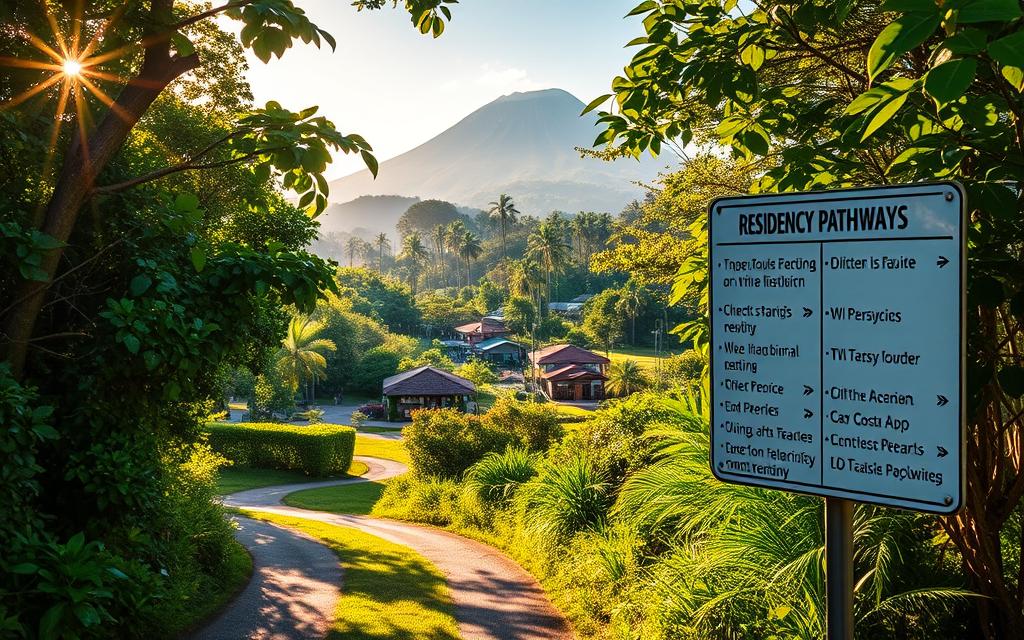Do I Need a Lawyer for Costa Rica Residency? | JARO S.C.R.

Over five million people call Costa Rica home, and many more are drawn to its vibrant culture and high quality of life. The country offers diverse residency programs, making it an attractive destination for individuals and families seeking stability and opportunity.
Navigating the residency application process can be complex. From gathering essential documents to meeting specific income or investment requirements, the steps involved often require meticulous attention to detail. Professional guidance can help streamline this process and reduce the risk of errors or delays.
Understanding whether expert support is necessary is crucial. Properly organized documentation and adherence to legal requirements can make the difference between approval and rejection. Let’s explore the benefits of seeking professional assistance and how it can enhance your experience.
Understanding Costa Rica Residency Options

Costa Rica offers a variety of residency options tailored to different lifestyles and goals. Whether you’re an investor, retiree, or professional, understanding these pathways is essential for a successful application. Each option comes with specific requirements and benefits, making it crucial to choose the one that aligns with your personal and financial situation.
Rentista, Investor, and Permanent Residency Explained
The Rentista program is ideal for individuals with a steady income. Applicants must demonstrate a monthly income of $2,500 for at least two years. This option is perfect for those who want to live in Costa Rica without engaging in local employment.
For those looking to invest, the Investor program requires a minimum investment of $150,000 in real estate or other approved ventures. This pathway not only grants residency but also opens doors to business opportunities in the country.
Permanent Residency is the ultimate goal for many. After holding temporary residency for three years, individuals can apply for this status. It offers long-term stability and eliminates the need for frequent renewals.
Tailoring Options to Your Personal Situation
Choosing the right residency option depends on your financial stability, immigration status, and personal goals. For example, investors may benefit from the Investor program, while retirees might prefer the Rentista or Pensionado pathways.
Financial stability plays a key role in the decision-making process. Ensuring you meet the income or investment requirements is critical for a successful application. Additionally, understanding the legal guidelines and seeking professional advice can help tailor your application to your unique needs.
By carefully evaluating your circumstances, you can select the residency option that best suits your lifestyle and long-term plans in Costa Rica.
Navigating the Paperwork and Legal Challenges

Handling the paperwork for residency in Costa Rica can feel overwhelming without proper guidance. The process involves gathering essential documents, ensuring they meet legal standards, and navigating interactions with government agencies. Proper preparation is key to avoiding delays and ensuring compliance with Costa Rican law.
Essential Documents and Apostilles
Accurate documentation is the foundation of a successful residency application. Key documents include passports, birth certificates, and criminal record checks. These must be apostilled, a process that verifies their authenticity for international use. Missing or improperly prepared paperwork can lead to significant delays.
For example, birth certificates must be recent and include all necessary details. Criminal record checks should cover all countries where the applicant has lived. Apostilles ensure these documents are legally recognized in Costa Rica, streamlining the application process.
The Role of Government Agencies
Several government agencies play a crucial role in the residency process. The Caja Costarricense de Seguro Social (Caja) handles health insurance requirements, ensuring applicants meet mandatory coverage standards. The Ministerio de Hacienda (Hacienda) oversees tax compliance, verifying financial stability for residency.
The Instituto Nacional de Seguros (INS) manages additional insurance requirements, such as property or vehicle coverage. Understanding the roles of these agencies helps applicants prepare the necessary documentation and avoid common pitfalls.
For more detailed guidance on the residency process, visit our guide on obtaining residency in Costa.
Do I need a lawyer to apply for Costa Rica residency?

Navigating the legal intricacies of residency in Costa Rica often requires professional expertise. While some individuals may attempt the process independently, the complexities of immigration law and documentation can pose significant challenges. Understanding when to seek legal support can save time, reduce stress, and increase the likelihood of a successful application.
When Legal Expertise Becomes Crucial
Certain scenarios make hiring a lawyer indispensable. For instance, regulatory changes can occur without notice, and an experienced professional can ensure compliance with the latest requirements. Additionally, managing deadlines and submitting accurate paperwork is critical to avoid delays or rejections.
Real-life examples highlight the importance of legal support. Many expats have faced setbacks due to incomplete or improperly prepared documents. A seasoned lawyer can help navigate these challenges, ensuring all requirements are met efficiently.
Legal guidance also helps avoid costly errors. Missteps in the application process can lead to additional fees or even the need to restart the process entirely. By working with an expert, applicants can minimize these risks and focus on their transition to Costa Rica.
While some may choose to handle the process independently, the support of a legal professional often proves invaluable. Their knowledge of immigration law and experience with residency applications can streamline the process and provide peace of mind.
Alternative Pathways 
Costa Rica provides diverse pathways to residency, each tailored to unique personal circumstances. Beyond traditional options like investment or rentista programs, individuals can explore alternatives such as marriage, retirement, or employment. These pathways offer flexibility and cater to different lifestyles, making them ideal for those seeking long-term stability in the country.
Residency through Marriage
Marriage to a Costa Rican citizen or permanent resident can expedite the residency process. Applicants must provide a valid marriage certificate and proof of a genuine relationship. This pathway simplifies the procedure, as family ties are prioritized in immigration policies.
Meeting the eligibility requirements is essential. Applicants must ensure all documents are apostilled and translated into Spanish. This category offers a straightforward route to permanent residency, provided all legal standards are met.
Retirement and Pensionado Programs
Retirees can apply for the Pensionado program, which requires a minimum monthly income of $1,000 from a qualified pension plan. This option is popular among those seeking a relaxed lifestyle in Costa Rica’s scenic environment.
Applicants must demonstrate financial stability and provide proof of income. The Pensionado program also offers benefits like discounts on healthcare and public services, making it an attractive choice for retirees.
Employment Opportunities
Securing a job in Costa Rica can lead to residency through the employment category. Employers must sponsor the applicant, and the position must meet specific skill or labor market requirements. This pathway is ideal for professionals seeking to work and live in the country.
Understanding the procedure is crucial. Applicants must provide employment contracts, proof of qualifications, and other supporting documents. This category ensures a smooth transition for those relocating for work purposes.
Each residency pathway has unique advantages and eligibility criteria. By carefully evaluating your situation, you can choose the option that aligns with your goals. For more details on dual citizenship, visit our guide on Costa Rica dual citizenship.
Benefits of Obtaining Residency in Costa Rica
Acquiring residency in Costa Rica unlocks numerous opportunities for a better life. From ending the cycle of border runs to gaining legal work rights, the advantages are substantial. Residency also provides access to local services, enhancing everyday convenience and stability.
Eliminating Border Runs and Gaining Work Rights
One of the most significant benefits of residency is the elimination of border runs. Tourists must leave the country every 90 days, but residency allows individuals to stay indefinitely. This saves time and reduces the stress of frequent travel.
Residency also grants the legal right to work. This opens doors to employment opportunities and access to local benefits. Whether you’re pursuing a career or starting a business, residency provides the foundation for long-term success.
Access to a Costa Rican Driver’s License and Local Privileges
With residency, individuals can obtain a Costa Rican driver’s license. This simplifies transportation and enhances mobility. A local license is often required for renting or purchasing vehicles, making it a practical necessity.
Residency also offers access to local privileges, such as healthcare and education. These services contribute to a higher quality of life and ensure stability for individuals and families. For more details on legal services, visit our Costa Rica legal services page.
Additionally, residency can open doors to real estate and business opportunities. Tax exemptions and other benefits make it easier to invest in property or start a venture. These advantages make residency a valuable step toward building a fulfilling life in Costa Rica.
Managing Costs, Time, and Bureaucracy
Managing the financial and administrative aspects of residency in Costa Rica requires careful planning and preparation. From government fees to legal expenses, the process can be both costly and time-consuming. Understanding these challenges helps applicants budget effectively and avoid unexpected setbacks.
Personal Experiences and Tips from Expats
Many expats have shared their journey through the residency process, offering valuable lessons for newcomers. Their stories highlight both the challenges and successes of navigating immigration requirements. Learning from these experiences can help others avoid common pitfalls and streamline their own applications.
Lessons Learned from Real-Life Residency Applications
One common challenge expats face is managing the extensive paperwork. Missing or improperly prepared documents can lead to significant delays. For example, a mismanaged application may result in additional fees or even the need to restart the process entirely.
Timely legal support can make a significant difference. Many expats have found that working with an expert ensures compliance with changing regulations. This not only speeds up the process but also reduces stress and uncertainty.
Insurance is another critical aspect. Enrolling in the Caja Costarricense de Seguro Social (CCSS) is mandatory for most residency holders. However, some expats opt for private health insurance to access broader services and shorter wait times.
Understanding the process is key. From gathering essential documents to meeting income requirements, preparation is crucial. Expats often emphasize the importance of starting early and staying organized throughout the application.
By learning from others’ experiences, newcomers can approach the residency process with confidence. Seeking expert advice and being prepared for unexpected hurdles can make the journey smoother and more successful.
Conclusion
Living in Costa Rica offers a unique blend of natural beauty, cultural richness, and long-term stability. Understanding the residency process is essential for a smooth transition. From gathering the right documents to navigating legal requirements, each step demands attention to detail.
Professional support can simplify the application process, ensuring compliance with immigration laws. Whether you’re exploring investment opportunities or seeking permanent residency, expert guidance can save time and reduce stress.
By carefully evaluating your options and preparing thoroughly, you can take the right path toward a fulfilling life in this vibrant country. Make informed decisions and embrace the advantages of living in Costa Rica.


